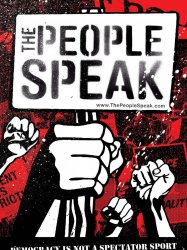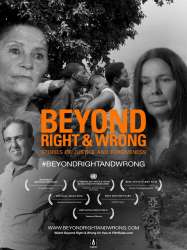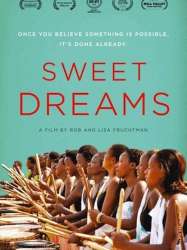God Sleeps in Rwanda is a film of genre Documentary released in USA on 15 august 2005 with Rosario Dawson
God Sleeps in Rwanda (2005)

If you like this film, let us know!
Released in USA 15 august 2005
Length 28minutes
Genres Documentary
Themes Films set in Africa, Films about racism, Documentary films about racism, Documentary films about law, Documentary films about war, Documentary films about historical events, Documentaire sur une personnalité, Documentary films about politics, Political films
Rating71%










God Sleeps in Rwanda is a 2005 documentary short subject about five women affected by the Rwandan genocide.
On January 31, 2006 it was nominated for the Academy Award for Documentary Short Subject. It lost to A Note of Triumph: The Golden Age of Norman Corwin.
Actors

Rosario Dawson
(Narrator)
Comments
Leave comment :
Suggestions of similar film to God Sleeps in Rwanda
There are 54 films with the same actors, 8975 with the same cinematographic genres, 11441 films with the same themes (including 16 films with the same 9 themes than God Sleeps in Rwanda), to have finally 70 suggestions of similar films.If you liked God Sleeps in Rwanda, you will probably like those similar films :

The People Speak (2009)
Origin USA
Genres Documentary, Historical
Themes Documentary films about historical events, Documentary films about politics, Political films
Actors Matt Damon, Morgan Freeman, Danny Glover, Rosario Dawson, Sean Penn, Viggo Mortensen
Rating72%






Miss Representation (2011)
, 1h25Directed by Jennifer Siebel (Newsom)
Origin USA
Genres Documentary
Themes Feminist films, Documentaire sur une personnalité, Documentary films about politics, Political films
Actors Margaret Cho, Geena Davis, Rosario Dawson, Jane Fonda, Paul Haggis, Catherine Hardwicke
Rating74%





The film interweaves stories from teenage girls with provocative interviews, to give an inside look at the media and its message. The film’s motto, “You can't be what you can't see,” underscores an implicit message that young women need and want positive role models, and that the media has thus far neglected its unique opportunity to provide them. The film includes a social action campaign to address change in policy, education and call for socially responsible business.
 , 1h20
, 1h20Directed by Roger Spottiswoode
Origin USA
Genres Documentary
Themes Films set in Africa, Films about racism, Films about religion, Films about terrorism, Documentary films about racism, Documentary films about law, Documentary films about war, Documentary films about historical events, Documentaire sur une personnalité, Documentary films about politics, Documentary films about religion, Political films, Films about Jews and Judaism
Rating71%






L'Afrique en morceaux (2000)
, 1h44Origin France
Genres Documentary
Themes Films set in Africa, Films about racism, Documentary films about racism, Documentary films about law, Documentary films about war, Documentary films about historical events, Documentaire sur une personnalité, Documentary films about politics, Political films
April, 1994. Genocide in Rwanda. 800,000 dead. A catastrophe that upset the balance in the entire region. The Great Lakes region of Africa ended the year with a bloodbath. This documentary shows the intrigues, the dramatic effects, the treasons, the vengeances that prevailed over those years and whose only goal was to maintain or increase each faction’s area of influence. In just ten years, the population saw all their hopes vanish: The dream of an Africa in control of its own destiny, alimentary self-sufficiency, the end of interethnic conflicts.

Rwanda pour mémoire (2003)
, 1h8Directed by Samba Félix Ndiaye
Origin France
Genres Documentary
Themes Films set in Africa, Films about writers, Films about racism, Documentary films about racism, Documentary films about law, Documentary films about war, Documentary films about historical events, Documentaire sur une personnalité, Documentary films about politics, Political films
In 1994, between April and July, the massacre of Tutsis and moderate Hutus left one million dead. Instigated by Fest’Africa, a dozen African authors met four years after the events as writers in residence at Kigali, to try to break the silence of African intellectuals on this genocide.
 , 1h
, 1hDirected by Andrew Goldberg
Origin USA
Genres Documentary
Themes Films set in Africa, Films about racism, Films about religion, Documentary films about racism, Documentary films about law, Documentary films about war, Documentary films about historical events, Documentaire sur une personnalité, Documentary films about politics, Documentary films about religion, Political films, Films about Jews and Judaism
Rating67%






Sweet Dreams (2012)
, 1h26Directed by Lisa Fruchtman
Origin USA
Genres Drama, Documentary, Historical, Musical
Themes Films set in Africa, Films about music and musicians, Films about racism, Documentary films about racism, Documentary films about law, Documentary films about war, Documentary films about historical events, Documentary films about music and musicians, Documentaire sur une personnalité, Documentary films about politics, Musical films, Political films
Rating76%






My Neighbor, My Killer (2009)
, 1h20Directed by Anne Aghion
Origin France
Genres Documentary
Themes Films set in Africa, Films about racism, Documentary films about racism, Documentary films about law, Documentary films about war, Documentary films about historical events, Documentaire sur une personnalité, Documentary films about politics, Political films
Rating75%






Screamers (2006)
, 1h29Origin USA
Genres Documentary
Themes Films set in Africa, Films about racism, Documentary films about racism, Documentary films about law, Documentary films about war, Documentary films about historical events, Documentaire sur une personnalité, Documentary films about politics, Political films
Actors Shavo Odadjian
Rating58%






Flower in the Gun Barrel (2008)
Origin USA
Genres Documentary
Themes Films set in Africa, Films about racism, Documentary films about racism, Documentary films about law, Documentary films about war, Documentary films about historical events, Documentaire sur une personnalité, Documentary films about politics, Political films
Rating80%





To a large extent, the film consists of interviews with genocide survivors, many of whom were children in 1994. In all, over thirty survivors, perpetrators, and experts were interviewed for the film. In these interviews, the survivors discuss what it means to be a Rwandan and to live next door to people who killed their families. The survivors describe how they deal with their country's request that they forgive one another and move on, so that Rwanda can rebuild and unify itself. Perpetrators' views illuminate the madness that seized the culture in 1994; exploring the experience of apologizing to victims, and examining what it is like to be looked at as a murderer in Rwandan society.
 Connection
Connection